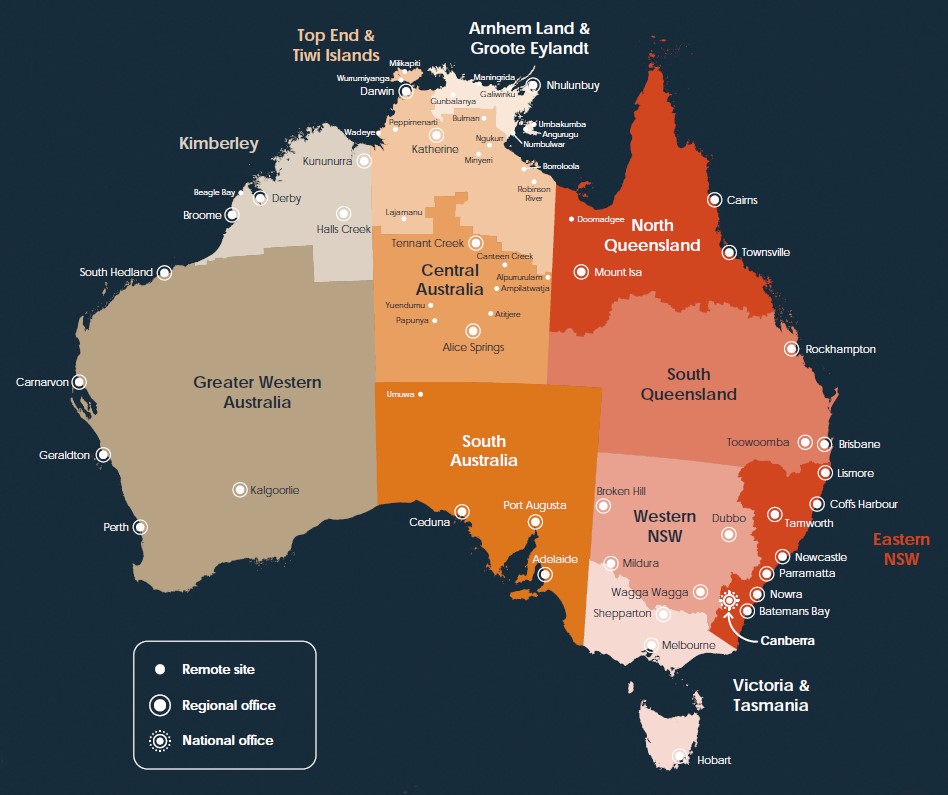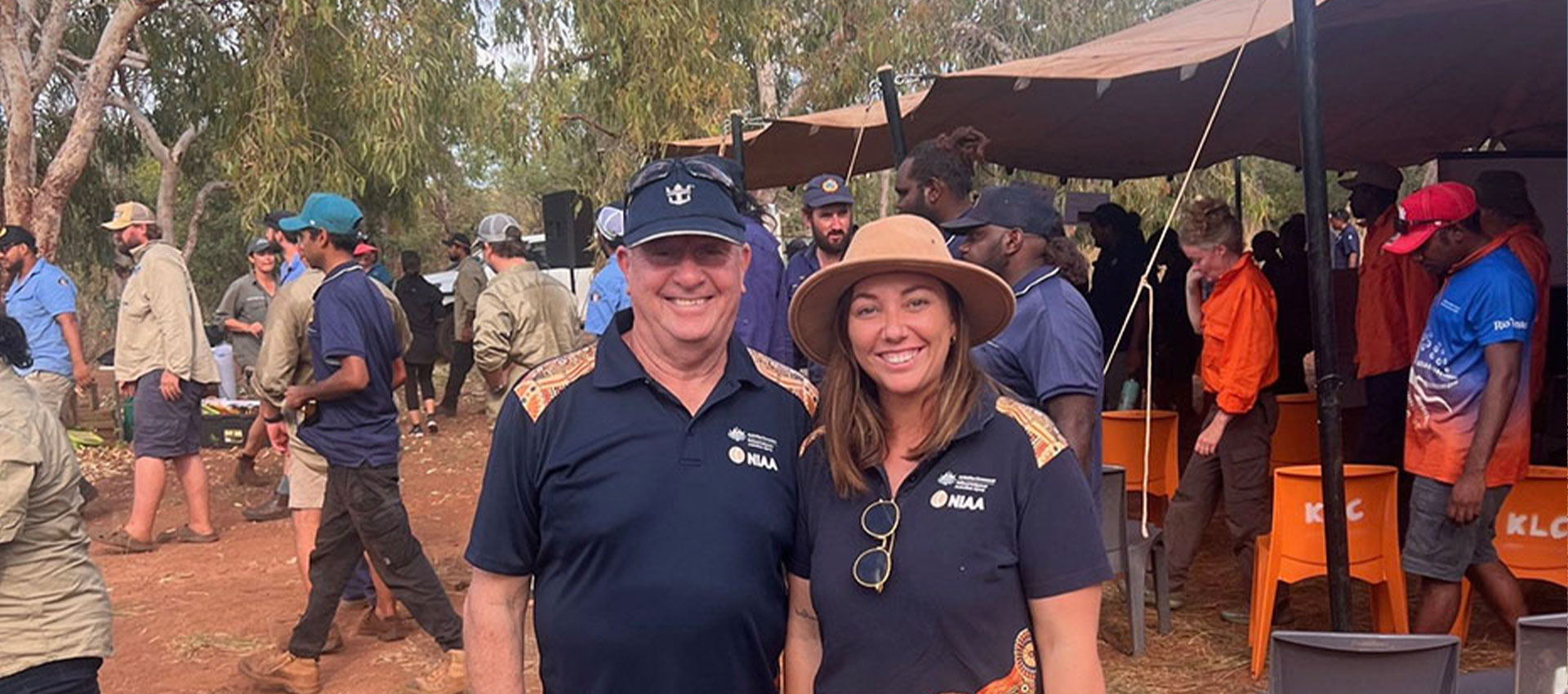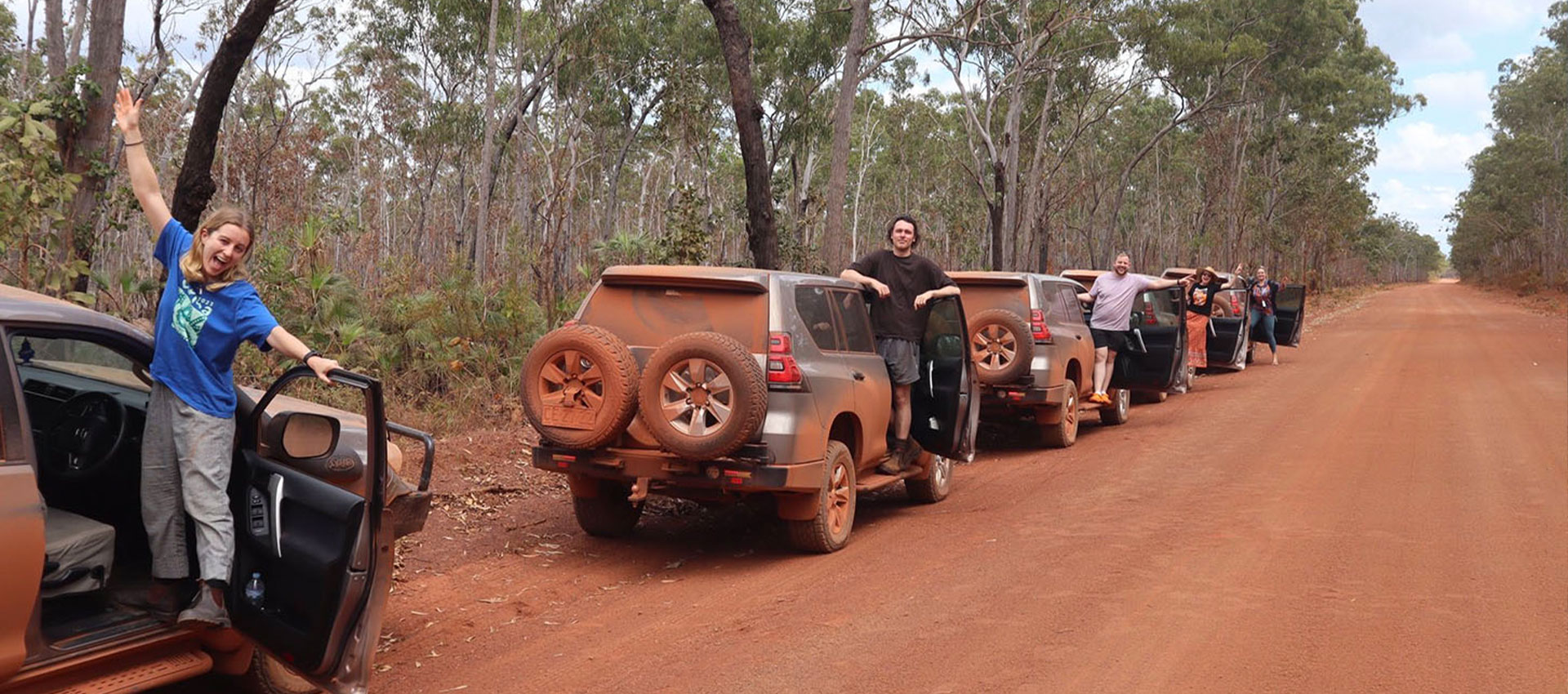The NIAA’s genuine partnerships, regional presence and commitment to integrity and reconciliation are key enablers to ensure we effectively manage these factors and successfully perform our key activities. They are essential to delivering on our purpose.
Genuine partnerships
First Nations voices are at the centre of our planning, priority-setting and decision-making. The NIAA partners with First Nations communities in a variety of ways, for example through participating in Closing the Gap policy and place-based partnerships, Empowered Communities, local models and taskforces. Each partnership has different stakeholders and objectives, and arrangements are unique. Working in place requires a flexible approach that responds to the diverse needs of First Nations communities.
The NIAA also works closely in place with First Nations leaders, communities, organisations and other stakeholders to deliver more than 2,600 activities through nearly 1,500 organisations across Australia. We are also working closely with the APSC to realise the principles of the Charter of Partnerships and Engagement.
We partner with communities, alongside state and Commonwealth government entities, on initiatives that create tangible progress against key Closing the Gap socio-economic targets. The NIAA also works closely in place with First Nations leaders, communities, organisations and other stakeholders to deliver more than 2,600 activities through nearly 1,500 organisations across Australia. We are also working closely with the Australian Public Service Commission to realise the principles of the Charter of Partnerships and Engagement.
We continue to play a central role in informing whole-of-government priorities for First Nations peoples and in enabling policies, programs and services being tailored to the diverse needs of communities. We do this by leveraging the strong relationships we have built with First Nations communities and through structures such as the Coalition of Peaks, Empowered Communities and the ALG.
Communities
We talk directly with communities because they know what's needed to make a positive difference.
Non-government organisations
We support providers to deliver quality services
First Nations Peoples
We partner with Indigenous peoples so they have an equal say in the policies that affect them.
Industry
We encourage industry to partner with First Nations communities to facilitate mutual benefits.
State, territory and local governments
We work with other jurisdictions to get the best outcomes for Indigenous peoples.
Australian Government
We lead and influence across the government to ensure the impacts for First Nations communities are considered.

Our regional presence
The NIAA’s regional network of offices across urban, regional and remote locations is a unique and critical on-the-ground presence for the Australian Government. Our staff work closely with First Nations communities and stakeholders – including Aboriginal Community Controlled Organisations, nongovernment organisations and state and territory jurisdictions – to identify and progress First Nations peoples’ needs and aspirations.
The NIAA’s regional network staff work with communities to provide practical action towards local partnership agreements, data sharing, and policy outcomes. We actively engage with First Nations communities and key stakeholders to play a strategic role to influence policy and program design. Staff across the NIAA’s extensive footprint readily lean into emerging priorities including natural disaster preparedness and responses.
As we build and maintain effective partnerships with communities, organisations and peak bodies, our regional footprint contributes to the empowerment and self-determination of First Nations peoples.

All our office locations are listed in full in Appendix A.
Integrity
Integrity is a cornerstone of good governance and is central to the effective functioning of the APS to support the development and delivery of policies, services and initiatives that affect the lives of all Australians. Integrity in the APS is the pursuit of high standards of professionalism – both in what we do and in how we do it.
A strong integrity culture at the NIAA supports our ability to achieve our purpose, successfully deliver our key activities, and demonstrates our commitment to implementing APS Reform Priority 1: An APS that embodies integrity in everything it does. It also ensures our actions and behaviours match our values and builds a culture of trust and integrity.
The focus over the next 12 to 18 months will be:
- to establish the foundations of a robust NIAA Integrity Framework
- implement the NIAA Integrity Strategy and Action Plan 2023–2025
- strengthen psychological safety to promote a ‘speak up’ culture
- embed proactive detection and early intervention processes.
Through this work, the NIAA will realise the benefits that a strong pro-integrity culture brings and the opportunities created through building stronger relationships and fostering trust with those we serve.
A strong integrity culture supports us to achieve our purpose.

Image: NIAA staff at the 2024 Kimberley Ranger Forum, Nyul Nyul country, Western Australia
Reconciliation
Reconciliation is central to all our work at the NIAA. We work together to support the aspirations of Aboriginal and Torres Strait Islander peoples. To enable reconciliation, we recognise and value the living cultures, stories and songlines of First Nations peoples and acknowledge the historical injustices against Aboriginal and Torres Strait Islander peoples. We play a key role in promoting reconciliation across the Commonwealth to ensure that reconciliation is driven across all levels of the APS.
We continue to grow Footprints, our flagship cross-cultural learning framework. Through the APS Academy, staff across the APS are supported to strengthen and continue to build their cultural competency. In addition to this, the NIAA also supports:
- the Indigenous Champions Network, bringing together leaders from across the APS who champion reconciliation and cultural competency in the public sector
- public officials who have previously attended the Garma Festival to share their learnings and insights from the festival and how these will drive change in policies and practices in their agencies.
Strengthening relationships with Aboriginal and Torres Strait Islander peoples is key to reconciliation, and we will continue to focus on this through the implementation of our Stretch Reconciliation Action Plan 2022-2025 and through the development of our next RAP.
We recognise and understand the living cultures, stories and songlines of First Nations peoples.

Image: NIAA staff on their way to Garma Festival 2023, East Arnhem Land, Northern Territory